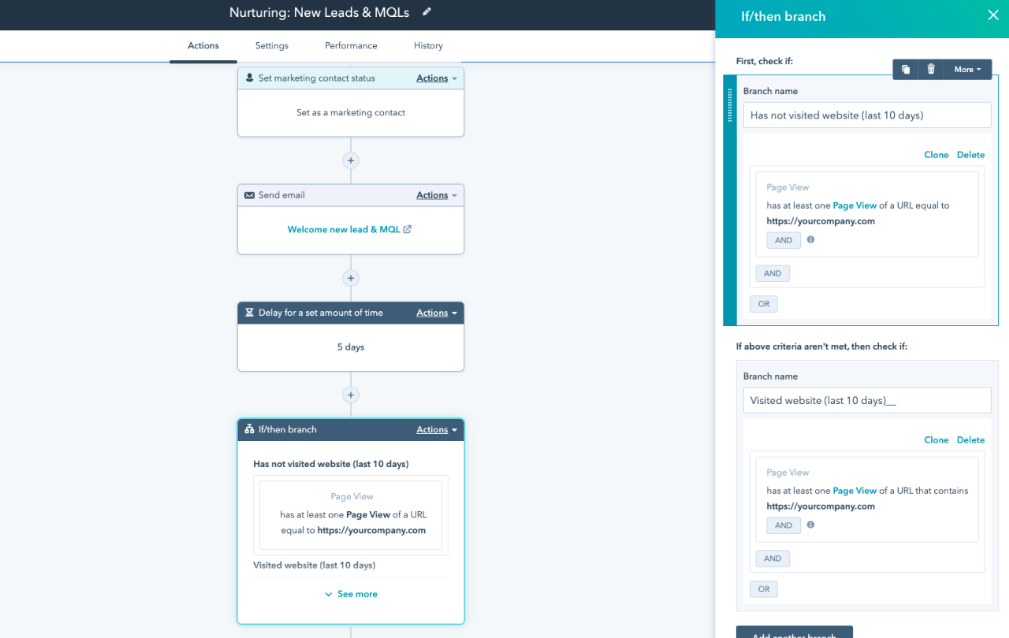Intelligent Automation in CRM: accelerating your company's success
In today’s business environment, where the customer is central to every decision, effectively managing relationships has become a critical factor...
By Role
By Industry
By Target Customer
What We Offer
We drive business growth by improving operational efficiency through process optimization, smart automation, and cost control. Our approach boosts productivity, reduces expenses, and increases profitability with scalable, sustainable solutions
Customer Experience
We design memorable, customer-centered experiences that drive loyalty, enhance support, and optimize every stage of the journey. From maturity frameworks and experience maps to loyalty programs, service design, and feedback analysis, we help brands deeply connect with users and grow sustainably.
Marketing & Sales
We drive marketing and sales strategies that combine technology, creativity, and analytics to accelerate growth. From value proposition design and AI-driven automation to inbound, ABM, and sales enablement strategies, we help businesses attract, convert, and retain customers effectively and profitably.
Pricing & Revenue
We optimize pricing and revenue through data-driven strategies and integrated planning. From profitability modeling and margin analysis to demand management and sales forecasting, we help maximize financial performance and business competitiveness.
Digital Transformation
We accelerate digital transformation by aligning strategy, processes and technology. From operating model definition and intelligent automation to CRM implementation, artificial intelligence and digital channels, we help organizations adapt, scale and lead in changing and competitive environments.
Operational Efficiency
We enhance operational efficiency through process optimization, intelligent automation, and cost control. From cost reduction strategies and process redesign to RPA and value analysis, we help businesses boost productivity, agility, and sustainable profitability.
Customer Experience
Marketing & Sales
Pricing & Revenue
Digital Transformation
Operational Efficiency
5 min read
Por Sofia Ottone | May 29, 2025
5 min read
Por Sofia Ottone | May 29, 2025
You have surely heard the term CRM at some point. Today this tool is used by many companies. It is a philosophy of relationship management with customers or prospects. How can it impact the different departments of your company? What are the benefits? Why is it a key piece for your company?
1. HubSpot
2. Salesforce
3. Oracle
What is a CRM?
In which areas of your company can you use a CRM?
1. Customer Service CRM
CRM plays a fundamental role in the establishment and maintenance of customer relationships, considered the most crucial for any company. The implementation of efficient management becomes indispensable for sustained growth and differentiation from the competition.
Loyalty and customer service becomes a more effective task through the exchange of personalized information, collected through CRM. Using different communication tools such as e-mails, calls, SMS, facilitates the personalization of responses and improves the rapid resolution of problems.
The ability to efficiently manage the information collected through CRM not only strengthens the relationship with existing customers, but also provides a strategic advantage by allowing the company to continuously adapt to changing market needs. Finally, this comprehensive management helps to build customer loyalty and establish a solid position in the marketplace.
2. Marketing
As mentioned above, CRM plays a crucial role in allowing the identification and centralization of contacts, thus creating a high quality database. This database provides complete visibility of each stage that's followed before achieving a conversion rate (analyzing data, sales numbers, ROI). This approach not only provides a detailed understanding of performance but also facilitates the adaptation and optimization of the marketing strategy, which is essential for business success.
The personalization created by automation is key to building stronger and more meaningful relationships with the target audience. This personalization not only improves the effectiveness of interactions, but also allows for more direct targeting with more precise identification of prospect and customer needs.
The use of CRM enhances a company's ability to tailor its marketing strategy and deliver a more personalized experience, thus contributing to the success of your business.
3. Sales
In sales, a CRM provides a real-time view of the number of prospects and customers registered in your database, along with crucial information such as email, first name and last name, and phone number. This not only allows instant identification of contacts, but also provides a complete view of the sales team's interaction with customers and prospects. It also provides a detailed history of sales opportunities, contracts, and activities associated with the sales process.
Quick access to essential information makes it easy for your sales team to evaluate the progress of each prospect throughout the sales cycle and track each stage in detail. This improves team efficiency by providing a clear understanding of opportunities and challenges in real time.
CRM is not limited to data collection; it also includes comprehensive analytics and reporting functionality where teams can track individual and collective progress, analyze sales trends, identify opportunities for improvement.
4. After Sales Service
After-sales service plays a crucial role in maintaining a relationship of trust with customers. Integrating a CRM into your team takes this service to a higher level of quality. Through the ticket creation functionality, it is possible to track each pending request and maintain an organized history of each resolution made. This reduces wait time and allows a personalized experience by efficiently addressing any request, problem, or concern customers may have after making a purchase. Access to an organized history streamlines the resolution process, providing fast and effective responses.
The integration of a CRM not only optimizes the management of requests and resolutions, but also contributes to building a stronger and more satisfying post-sales experience for customers. Providing quick and personalized responses strengthens the customer relationship, which is essential for long-term retention and loyalty.
What are the benefits of a CRM platform?
1. Centralizes customer data information
A CRM allows you to collect a wide range of information and data related to customer management. This capability not only simplifies the monitoring of your company's activity but also allows you to adapt in real time the necessary measures to be taken in order to satisfy customer needs in an agile manner.
In addition, this information can be easily transmitted to the different teams in your company, thus streamlining collaboration between them. It also allows each team to obtain specific analyses that contribute to a richer and more accurate understanding of customer needs and expectations. This integrated approach not only optimizes decision making, but also facilitates a more complete and shared view of the customer relationship across the organization.
2. Optimization of the activity
Implementing a CRM tool means taking advantage of a solution that facilitates the monitoring of your daily activity. By centralizing and organizing data, CRM not only simplifies information management, but also makes it possible to analyze it in detail. This analysis contributes significantly to the comprehensive monitoring of your company's activity, allowing you to gain valuable insights and make decisions based on the information gathered.
3. Identify opportunities
The analytical functionality of a CRM allows the various teams in your company to identify opportunities by analyzing the data available on each customer. Marketing and sales campaigns can be tailored based on the results obtained, boosting opportunities for exceptional performance.
In doing so, you not only improve customer interactions, but also maximize your chances of success by adapting sales and marketing actions in real time.
By using a CRM, you can consolidate your sales forces according to market demands, as well as optimize the production of marketing campaigns.
4. Analysis and reports
A CRM system provides analysis and reporting tools that allow teams to evaluate their individual goals, identify opportunities for improvement and make decisions based on concrete reports, according to established expertise and objectives.
This analytical capability is tailored to the specific needs and goals of each team, providing a personalized view of results and allowing proactive adjustments to maximize performance and achieve established objectives. In short, the effective use of CRM analysis and reporting tools translates into more efficient management and continuous optimization of processes within the company.
5. Process automation
Process automation within a CRM facilitates the efficient execution of repetitive and routine tasks, freeing teams from the manual workload. This efficiency not only speeds up day-to-day operations, but also provides the opportunity to dedicate resources and efforts to more meaningful strategic initiatives.
From contact management to tracking customer interactions, automation in a CRM contributes to higher productivity and improves the quality of work.
6. Increased productivity and teamwork
CRM facilitates collaboration between teams and external companies by providing transparent communication and information sharing. This promotes a more effective solution for customer relationship management, enabling better performance and facilitating the delivery of a consistent, high-quality customer experience.
In addition, by facilitating a collaborative environment, CRM helps optimize internal processes, eliminating redundancies and improving operational efficiency. This translates directly into increased team productivity, as barriers to information sharing are removed and active collaboration is fostered.
The best CRM for B2B and B2C companies

Salesforce
Oracle
Why a CRM is key for your company
The implementation of a CRM tool is necessary for the evolution and success of your company. It allows you to collect, visualize or analyze information from different areas of your company. This approach not only optimizes current performance, but also lays the foundation for sustainable growth in an increasingly dynamic business environment. Ultimately, a CRM system proves to be the key to empowering business development today, facilitating more efficient management, informed decision making and strengthening customer relationships.

In today’s business environment, where the customer is central to every decision, effectively managing relationships has become a critical factor...

In today's business landscape, where adaptability and operational efficiency are crucial, effective team collaboration stands as the cornerstone of...

Blogging is used to nurture your audience with valuable content, but also to attract people to your website. It is also a fundamental part of Inbound...